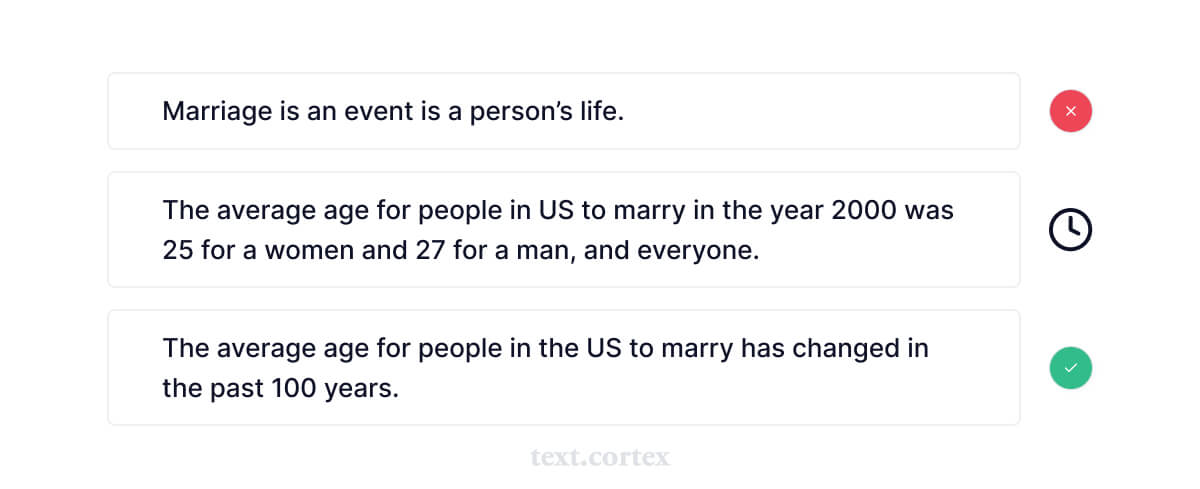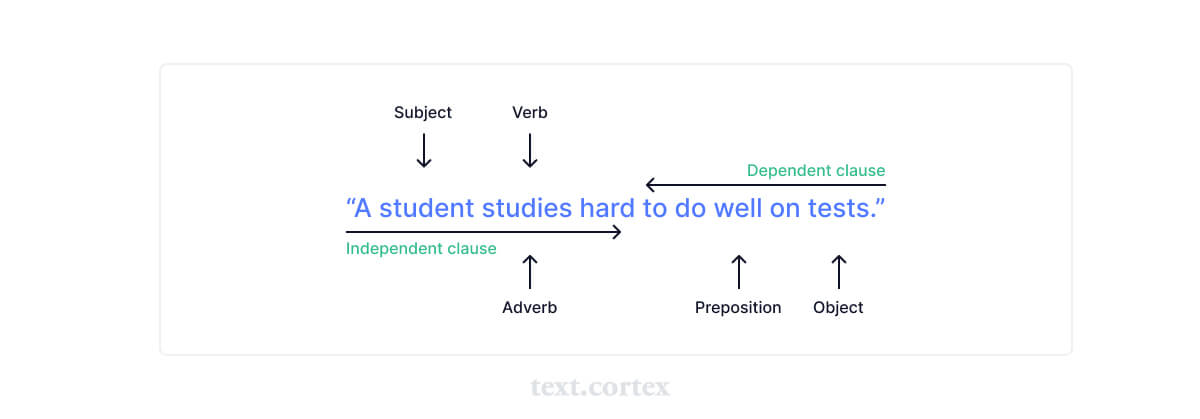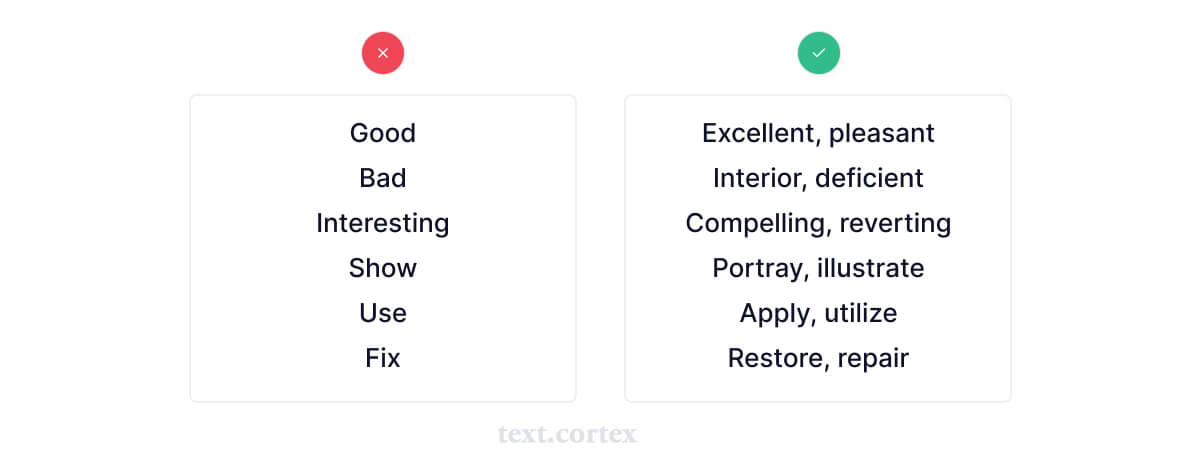Are you having trouble coming up with new ways to rewrite sentences so they sound more engaging to your audience while maintaining their original context?
Everyone does sometimes, and it can sometimes be tedious and exhausting work.
Any good content writer always prefers a genuine article over reused or "refurbished" content.
When creating an original article, you want to exhibit your ingenuity and creativity through sentences to gain positive feedback and reach as many people as possible.
It can be tricky because many writers struggle to properly structure sentences without losing their original context.
When rewriting a sentence, its final form needs to be understandable, concrete, and in alignment with the original concept.
To accomplish this, you need to learn and follow certain rules when rewriting them to sound more proficient and to avoid plagiarism.
Today, we'll go through the top 7 methods of how to rewrite a sentence without changing the meaning, making them sound more effective and on point.
Let’s dive in!
What Actually Is Rewriting?
Rewriting is a writing technique that we use to reword specific sentences or phrases in the text to gain better context.
For example, two writers can have the same idea or narrative on a particular issue or topic.
Both can create that very idea to sound unique with a similar effect level when playing with words.
When rewriting, it is crucial to express the first idea of the original sentence and keep the facts intact.
In simple words, rewriting is the method of expressing the same idea in different words.
Why Is Rewriting Important?
Rewriting is vital because it shows that you understand the idea behind the original message and its concept, and it helps you practice rewriting someone's thoughts in your own words.
Within rewriting, you can include 4 processes:
- Make longer sentences to avoid the appearance of a thought fragment.
- Make sentences shorter to make them sound clear and effective.
- Rephrase words to better match the sentence’s context.
- Paraphrase the whole sentence for more compelling meaning.
Some writers have an incorrect perception of rewriting purpose because they consider such a writing technique as "free launch" and no longer have to do their best work.
But it is important to say that rewriting articles is not for lazy writers because it requires the same energy as if you are writing the original content.
In addition, rewriting someone else's work is even more complex and can sometimes take much more time and focus than writing the original one.
Let’s see how you can rewrite yours.
How To Rewrite Sentence Without Changing The Meaning In 7 Easy Steps
1. Avoid too general sentences
We occasionally use sentences that are not entirely clear in their meaning.
You have an idea of what you want to say, but it may not be clear enough for the reader.
For example, if you say "Jake likes cars," we all can agree that this is a too general statement, right?
The reader will not understand if Jake likes cars for shopping, is a fan of driving them, or is perhaps a collector.
Adding a more specific verb in the sentence can increase its clarity and better express its meaning.
"Jake likes to drive cars."
"Jake likes to buy cars."
"Jake likes to collect cars."
"Jake likes to fix cars."
At the same time, you do not want to go overboard with being too specific in your statement.
That type of sentence can be overwhelming for your readers and may result in them leaving your article or post.
Let's take a look at another example.

You can’t tell the whole story in one sentence, and it is vital to have a balance when crafting them.
Each sentence introduces the one coming next, and each of them needs to have appropriate structure so the reader can read your content without difficulties and hesitation.
2. Improve your vocabulary
Vivid language is essential for readers to understand your message.
To achieve that it is always best to use more specific words instead of vague ones.
Vague words include “good,” “nice,” and “pretty.”
These words are so general that they can mean almost anything to anyone who hears them.
For example, if you say you had a “good” day at work, what does that mean exactly?
Did you do something nice for someone?
Did you get a promotion or pay raise?
Did you eat something delicious?
This is why vague words are often used to describe feelings or emotions, which can be even more difficult for a reader to interpret.
Here are some ways to add more vividness to your writing:
- Use action verbs
Instead of saying “the man walked in the room,” say “the man strode confidently across the room.”
This gives readers a much better visualization and impression of how the man entered the room.

- Add adjectives and adverbs
Using adjectives and adverbs is an excellent way to jazz up a sentence and make it more interesting.
For example, instead of saying “she was upset,” say “she was distraught.”
Likewise, instead of saying “he ran fast,” say “he sprinted across the field.”

- Use metaphors and similes
Metaphors and similes help you describe something in terms that aren’t true but still make sense in context.
For example, if someone enjoys life instead of saying “life is beautiful” they can say “life is like a box of chocolates”.

As your vocabulary grows, you will be able to express precise surroundings, emotions, and thoughts.
Enriching your vocabulary is an excellent way to practice "painting with words."
3. Reverse conditional sentences
If you need to rewrite conditional sentences, you can change the clause order — this goes for all of the conditional forms.
We use conditionals when we're talking about things that will happen in the future if something else happens first.
But conditional sentences are not so popular among readers because they sound too complex and complicated to consume.
There are two main types of conditional sentences:
- Conditional sentences with 'if'
Conditional sentences with 'if' are the first conditional that talk about possible situations in the future.
"If I win the lottery, I'll buy a Ferrari." (this is a possible future situation)
When your rewrite it sounds like this:

- Conditional sentences with ‘unless’
The second conditional talks about situations that are unlikely or impossible in the future.
Unless it rains, we’re going to play football on Saturday afternoon. (this is an unlikely or impossible future situation)

Reversing conditionals improves the readability of your statements and makes them sound more natural.
4. Change passive to active voice
The passive voice is a grammatical structure in which the subject is the object of an action, followed by a version of the verb 'to be.'

In passive voice, the subject receives, rather than performs, the action — the subject is receiving something rather than doing something.
That means that the person who performs the action is not included in a passive sentence.
Passive sentences can be fine, but they're often unnecessary.
Whenever you get a chance, change your passive voice to active to make sentences sound more direct and easier to consume.
5. Decompose complex sentences
Complex phrases are difficult to read and often undermine intelligibility and consistency.
To rewrite complex sentences, you must first identify each functional part of your sentence — the subject and verb for each clause.
For example: "A student studies hard to do well on tests."
This sentence has two clauses — one that describes a student and another that describes how they study.
The first clause is independent because it could stand alone as a separate sentence: "A student studies hard".
The second clause is dependent because it depends on what comes before it to make sense: "will do well on tests."
So we have two separate clauses here, and they need to be combined into one cohesive statement.
Sometimes this is not the case, which is why is a good practice to recognize if you can decompose your sentences for better readability.
You can use the "functional analysis" technique to break down your sentences and make them more readable.
Functional analysis is a way of breaking down a sentence into its functional parts — basically, all the words that do something in your sentence:
- Subject: Who or what is performing an action?
- Verb: The action that will take place in the simple present tense.
- Object: What is being acted upon?
- Adverbial phrase: How is this action being performed?
- Prepositional phrase: Where is this action taking place?
Here is an example of how to do that:

6. Use stronger synonyms
To use more substantial synonyms means scanning your document for weak or overused words and replacing them with better ones.
The most common examples of overused words are ‘very’ and ‘extremely’.
If you use these words too often, it makes your writing sound overly dramatic or overly emotional (or both).
A better alternative is to use stronger verbs instead — for example:
"You're very smart." becomes "You're brilliant."
Here are some examples of words you should replace when you are rewriting sentences.

This technique will make your writing less repetitive and more exciting and entertaining to read.
7. Use Article Rewriter Tools
Article rewriter tools enable you to write quickly and effectively without overthinking how to organize your thoughts on the blank page to seem more exciting and engaging.
Using a rewriting tool to paraphrase a sentence can be helpful since they only replace certain words with synonyms, and the original meaning of the content remains intact.
This way you can do your writing flawlessly and neatly in considerably less time.
Many people use these tools to improve their writing skills, making reading more interesting by using different kinds of synonyms and avoiding repetition throughout their writing pieces.
There are many good reasons why you should use online these kind of tools:
- You can save a lot of writing time.
- It will help you avoid plagiarism issues.
- Create always unique and compelling content.
- You can automatically have control over grammatical and spelling errors.
Utilizing article rewriter tools will improve your writing skills and teach you how to write good sentences and paragraphs with little effort.
Many websites provide free rewriting tools for creating ads, emails, articles, product descriptions, posts, etc.
Final Thoughts
We certainly hope that these 7 steps will help you get your 'magical' formula and permanently overcome difficulties in rewriting your paragraphs and sentences.
Rewording and paraphrasing are standard techniques that even most successful writers use.
Also, we are all familiar with that feeling of endless rereading the same sentence until you figure out why it doesn't 'feel' right.
Rewriting is a writer's innate reflex that serves its purpose, whether you are drafting a personal Facebook post or writing a masterpiece.
But let's be honest for a moment.
Rules are acceptable, but can you remember and apply them all while creative juices keep coming?
Or, worse, how can you apply rewriting rules when you do not know what you want to say?
Luckily, TextCortex has a solution for that.
TextCortex rewriter extension provides an AI solution that addresses all content writing and rewriting concerns and difficulties, including writer's block moments.
TextCortex uses complex machine learning processes to comprehend your context before rewriting it.
This is because we train our modules on billions of humans' high-quality use-cases.
As a result, our rewriting extension can produce output with varying levels of complexity that follow all guidelines for writing easy-to-read sentences.
In other words, whenever you generate or rewrite sentences using the TextCortex rewriting extension, there will be a human touch involved.
Here is how it works:
The TextCortex rewriter extension will save up to 70% of your writing time and assist wherever your writing cursor requires.
By implementing it in your writing flow, you will be able to:
- Rewrite sentences for a more natural-sounding output.
- Create long-form blog posts from a single sentence.
- Extend your text for more information.
- Summarize the original content for a concise bit of information.
- Make an engaging email out of bullet points.
- Autocomplete your sentences without finishing them.
To rewrite your sentences without altered meanings in a single click, sign up for free and watch how TextCortex boosts your writing skills instantly.




